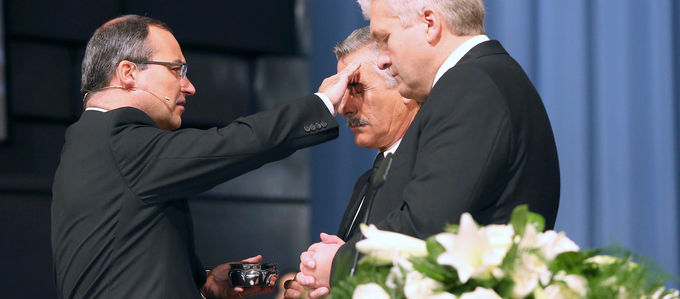
Who is entitled to dispense the sacraments? The various Christian denominations have some very similar answers to that question—even though they all come from very different perspectives in arriving at them. Also common to all of them is the one big exception.
The Protestant denominational family talks about the “universal priesthood of all believers”, which is based on the “royal priesthood” mentioned in the first epistle of Peter and in Revelation. According to this principle, each and every baptised individual is not only entitled to proclaim the word of God, but also to administer the sacraments—at least in purely theoretical terms.
How this actually works in practice is regulated by ecclesiastical law, however. Accordingly, the following applies: in principle, only trained pastors—and depending on the denomination, this may also include female pastors—have the mandate and the right to publicly proclaim the word and administer the sacraments.
Between ministry and mandate
So it is that the Protestant and Reformed churches end up landing not too far from those churches that are expressly ministerial in character, for example, the Catholic Church, the Orthodox Churches, or even the New Apostolic Church. There too, the dispensation of the sacraments is reserved for ordained or consecrated ministers.
The only other difference is that, while the Reformed tradition regards the respective church as the mandating authority, the churches of ministry require direct authorisation in the name of God.
Out of various hands
Almost all Christian denominations are agreed when it comes to Holy Communion: in practice, the administration of the sacrament is bound to a minister—who has been mandated one way or another.
Other acts are only acknowledged as sacraments in the Catholic Church, the Orthodox Churches, and parts of the Anglican Church—for example, Confession and Anointing of the Sick—and these are normally the responsibility of the priest (or pastor). On the other hand, Confirmation and Holy Orders (ordination of ministers) are reserved for the Bishop, in principle.
The New Apostolic Church is also familiar with such a delineation of duties: the dispensation of Holy Sealing is reserved for the Apostles alone.
A special case is the rule
According to Catholic doctrine, Matrimony constitutes a special case: here the two partners dispense their new status upon one another as a sacrament. However, a pastor must be present. By contrast, Orthodox doctrine regards the priest as the dispenser of the sacrament.
The really big exception applies to the vast majority of Christians and to the most fundamental of all sacraments: although baptism is generally reserved for ministers in all the major denominations, it can also be performed by any believer in cases of extreme emergency.
This also applies to the New Apostolic Church. According to the Catechism (chapter 8.1) this is because the validity of a baptism does not depend upon who dispenses it, but rather on how it is dispensed. The main principle that applies here is that the baptism must be performed de rite or “in the proper form”. What is behind this, and why it is so important, will be the focus of the next articles in this series.














